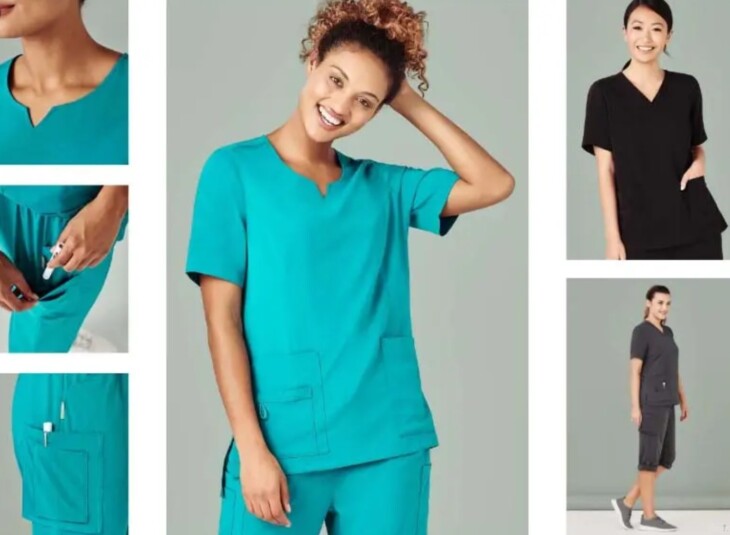Most jobs require some form of work outfit or uniform. There are many reasons why companies would prescribe what their employees wear to work. For some, a uniform can provide safety for workers. For example, you can’t wear stilettos during your shift in the emergency room. Other businesses, meanwhile, use uniforms as a crucial part of their marketing or branding strategies. Whatever reason your company has for having a dress code, the main idea behind a work outfit is to show the world that you’re ready for your job’s daily demands.
If the company you’re working with implements a dress code, you shouldn’t feel hampered in performing your job. Moreover, it would help if you didn’t think that wearing a work outfit prevents you from being unique in the workplace. Even with an office uniform or any type of work clothes, you can still express yourself and personalize your wear. Here are some things to keep in mind when giving your workwear a personal touch.
Contents
1. Don’t Go for Unisex Outfits
Most work establishments issue unisex uniforms to all their workers. Understandably, it has something to do with cutting costs. But there are jobs or workplaces where unisex work outfits may affect worker performance.
The medical profession is a good example. Traditionally, medical scrubs have been considered unisex clothing. Well, not anymore. Doctors and nurses shouldn’t wear gender-neutral outfits because of the demands of their jobs. Scrubs designed for women may not necessarily be suitable or comfortable for men. If you’re a male medical worker, you can visit this site to have made-for-you scrubs that are comfortable and functional.

2. Make Sure Your Attire Fits Your Work Environment
The outfit that you wear at work matters. One thing, it can affect the way you feel in the workplace, which can ultimately influence your performance. So, when personalizing your uniform or work attire, make sure to factor in your work environment. If your job requires you to be exposed to the sun for most of the day, then wearing thick or heavy clothing may not suit you. In the same way, it’s frowned upon to wear jeans and sneakers when you’re about to defend a client in the courtroom. Your customized work clothes should fit your work environment.

Source: WhoWhatWear
3. Don’t Be Shy About Putting on Accessories
Unless you’re working in the military or other fields with stringent rules on uniforms, you can accessorize your daily work outfit. Just make sure that such add-ons will not impede your work. For instance, medical professionals working in operating rooms can’t wear jewelry that may be lost, get snagged in various equipment, or cause hazards to both the wearer and the patient. Apart from those involved in delicate work situations, most types of jobs may allow some elbow room for adding accessories to work clothing or uniforms.
If your company outfit has simple neutral colors, you can add style by wearing simple jewelry such as a pair of earrings or a pendant necklace. Choosing the right set of bling can elevate your work attire or any outfit, for that matter. When it comes to wearing jewelry at work, just remember that the operative word is to accessorize and not make a bold statement. For men, adding accessories can be made by wearing lapel pins, tie bars, belts, watches, and unique socks.

Source: DMARGE
4. Avoid One-Size-Fits-All Work Attires
Just like with gender-neutral outfits, you should also avoid wearing one-size-fits-all uniforms or clothing. One apparent reason for this is that it reduced comfort. What fits your workmates won’t necessarily suit you. If your attire makes you feel you need to scratch on some areas of your body all the time, or if it doesn’t allow you to move freely, then your work performance can also suffer.
A good uniform or work outfit fits you snugly. One of the best ways to ensure that happens is to have your clothes tailored or measured according to your unique body shape and size. Having a made-for-you work outfit is a giant leap towards personalizing your work wardrobe.

Source: NBC News
5. Consider Your Outfit’s Functionality
It’s one thing to factor in your work environment when personalizing your work clothing, and it’s quite another to make sure that what you’re wearing is functional. When customizing your work attire, you need to go beyond style. Make sure you’re wearing something useful for the job.
For medical scrubs, it would help to have additional pockets where you can keep your work tools or devices. Another example would be outfits with reversible sides that allow you to wear one set of garments twice for any given week. It means you’ll spend less time in the laundry and still look as if you’re wearing a fresh set of clothes. Lastly, a functional outfit should allow you to move freely, especially if you’re working in a hospital setting where people’s lives matter.

Source: Lee T Shirts
6. Make Sure You’re Wearing Quality Clothing
You’ve come far on your quest to personalize your work clothes. You have shunned one-size-fits-all and unisex outfits not because you want to be unique but because you want to wear an outfit that fits you comfortably. Well, it would be a shame to stop there. Go the extra mile by choosing only good-quality workwear.
It doesn’t matter if you’re a company or an individual employee. When it comes to outfits, using top-quality clothing material is a good investment decision. For one, you’re sure that your clothes will be durable and usable for years to come. You’re less likely to spend on replacements, which is the case for low-quality clothing.
That said, if you want to personalize your work outfit, you might as well opt for quality materials. If you want your clothes to represent your personality at work or your company’s brand, you should never settle for second-rate outfits. It’s not to say that you should buy the most expensive clothing available. Getting good quality doesn’t always have to mean spending more money.

Source: Fairygodboss
Conclusion
Wearing a uniform or a prescribed set of clothing to work doesn’t mean you have to shelve your sense of style. By being a little creative, you can make any uniform or work attire pop and look unique in the workplace. However, adding your personal touch to your attire isn’t just about expressing your fashion sense. When personalizing your outfit, the overriding factor should be wearing clothes that will allow you to perform your job successfully and comfortably.
